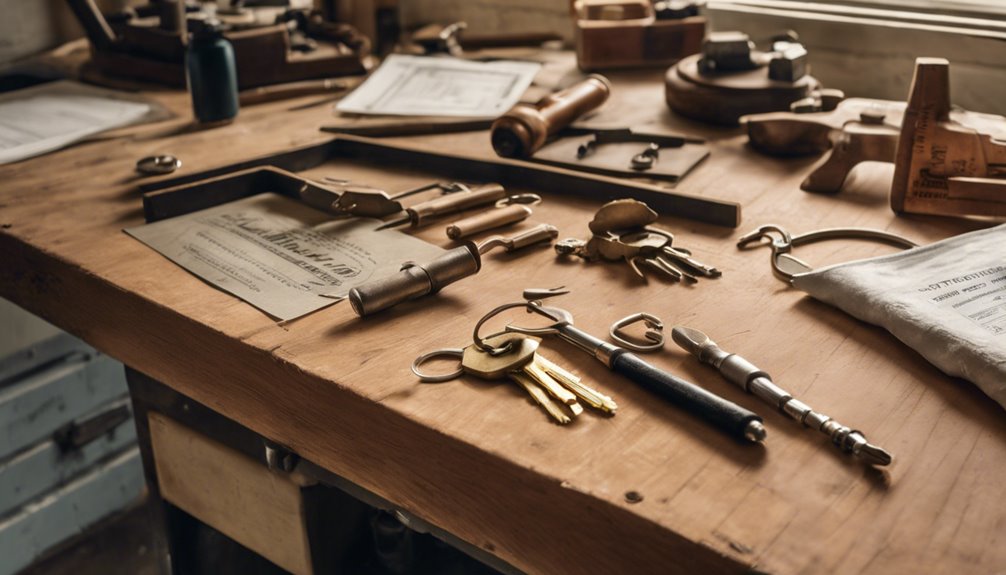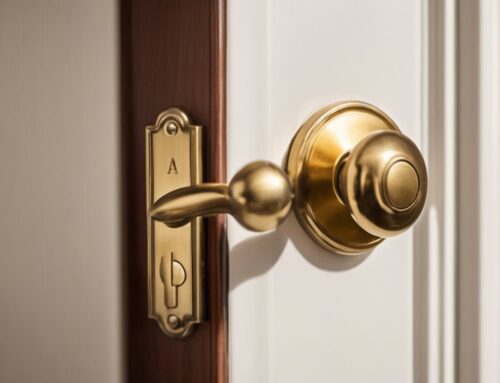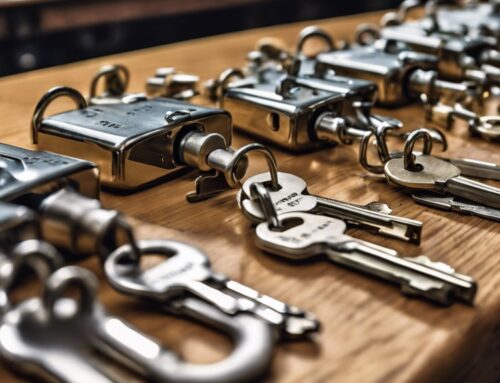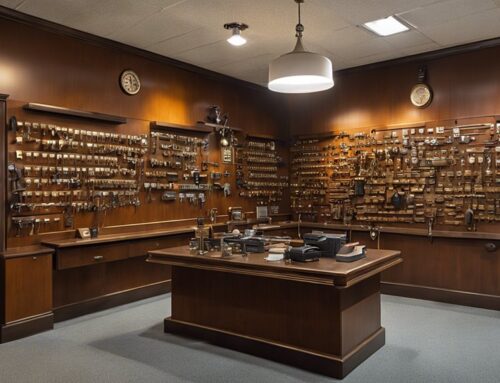If you think becoming an Illinois locksmith is as easy as picking a lock, you're in for a surprise. The apprenticeship laws and training standards are actually quite rigorous, requiring you to meet specific eligibility requirements and undergo thorough training. Understanding these regulations not only helps you navigate your path to becoming licensed but also guarantees you're prepared for the challenges ahead. Have you considered how these laws impact your potential career in locksmithing?
Key Takeaways
- Apprenticeship programs for locksmiths generally require candidates to be at least 18 years old and possess a high school diploma or GED.
- Training is provided through community colleges, vocational schools, and specialized centers, covering essential locksmith skills and knowledge.
- Recognized certifications like the Certified Licensed Locksmith (CLL) are eligible for credit towards apprenticeship requirements.
- Illinois requires a licensing examination and proof of general liability insurance of at least $1 million for practicing locksmiths.
- Continuing education of 24 hours every three years is mandatory to maintain compliance with industry standards and licensing requirements.
Eligibility Requirements for Apprenticeships

When seeking an apprenticeship in locksmithing in Illinois, it's crucial to understand the eligibility requirements that govern this pathway. To qualify, you must be at least 18 years old, though several programs allow individuals as young as 16 to enter. Generally, you'll need a high school diploma, GED, or similar credential, although some programs don't mandate specific educational entry barriers. Be prepared to provide an official transcript or equivalent documentation. Additionally, participating in structured training programs can enhance your chances of securing an apprenticeship. It's also worth noting that locksmiths in Illinois must adhere to regulatory measures that ensure a trustworthy practice.
Physical capabilities are critical for this work. You must lift up to 30 pounds and remain on your feet, using your hands and arms frequently. Your ability to bend and twist at the waist is also tested, alongside adjusting your vision for varying light conditions.
Legal considerations are equally paramount. You must demonstrate good moral character and have no history of addiction to alcohol or drugs. If you've faced felony charges, at least ten years must have lapsed since your full discharge from any sentence. A dishonorable discharge from the armed forces disqualifies you from the apprenticeship.
Finally, a structured application process awaits you. You'll need to submit a written Apprenticeship Agreement, fingerprints for background checks, and complete necessary paperwork, along with associated fees. Proof of liability insurance might also be required after you pass the licensing examination. Becoming a locksmith often involves pursuing continuous learning opportunities to maintain and enhance your skills.
Understanding these requirements will empower you on your journey to becoming a locksmith in Illinois.
Training Standards for Locksmiths

Apprenticeship opportunities provide an important foundation for those entering the locksmith profession, but understanding the training standards is equally important for developing the necessary skills. These standards shape you into a qualified locksmith, guaranteeing you possess the knowledge and expertise to excel in the field. Moreover, complying with employment laws ensures that you are protected and understand your rights in the workplace. Additionally, adhering to the essential lock safety standards is crucial for maintaining the integrity of your work and ensuring client trust.
Training programs are typically offered by community colleges, vocational schools, or specialized locksmith training centers. They provide a structured curriculum that includes both theoretical and hands-on instruction. You'll cover vital topics like key duplication, lockset functions, and basic master keying. Many of these programs culminate in certification, enhancing your credibility and employability. Additionally, a valid locksmith license is essential for employment or business operation, emphasizing the importance of proper training and certification.
Here's a quick overview of the training options available to you:
| Training Type | Description |
|---|---|
| Community Colleges | Offer structured locksmith courses with certification options. |
| Vocational Schools | Provide practical training alongside theory. |
| Specialized Training Centers | Focus exclusively on locksmith skills and techniques. |
| Apprenticeships | Gain hands-on experience directly from professionals. |
| Approved Courses | Must complete 20-hour basics for licensure eligibility. |
Additionally, continuing education is vital: every three years, you'll need 24 hours to stay updated on new techniques and maintain your licensure. By committing to ongoing learning, you guarantee you remain adept in a changing industry. Remember, these training standards are not just requirements but a pathway to professional freedom in your locksmith career.
Licensing Examination Process

Understanding the licensing examination process is vital for aspiring locksmiths, as it governs your entry into the profession.
You'll need to apply for the Illinois State Locksmith License Examination through the Illinois Department of Financial and Professional Regulation (IDFPR). Submitting your application at least 60 days before the exam date is essential to guarantee you meet all deadlines. Along with your application, you'll need to pay a total of $224, which includes a $174 license application fee and a $50 examination fee. Double-check that you've included all required documents to avoid delays. Additionally, being aware of the lock change laws for Illinois rentals can provide valuable context as you work in the locksmithing field.
To prepare effectively, review the material from your locksmith training or apprenticeship. Focus on the theory and practice sections, and consider utilizing scores from the Associated Locksmiths of America (ALOA) course if you completed it within the last three years. It is important to remember that licensing requirements differ significantly across states, so ensure you are aware of Illinois standards. Moreover, familiarize yourself with the key duplication laws that have implications for your practice as a locksmith.
Familiarizing yourself with the exam format—involving 305 multiple-choice and true/false questions—will also enhance your readiness.
The examination itself is held every March and September and lasts for 4 hours, testing your knowledge and skills in the locksmith profession. After taking the exam, you'll need to wait for your results, which are significant in finalizing your licensure.
Background Checks and Insurance

Before commencing your journey as a licensed locksmith in Illinois, it's crucial to address two key prerequisites: background checks and insurance.
First, you're required to submit your fingerprints for processing, as this will kick off a thorough criminal background check. This check evaluates both state and federal databases to confirm you're fit for the profession. Keep in mind, if you've been convicted of a felony, you can't obtain a license unless ten years have passed since you've completed your sentence. Additionally, any dishonorable discharge from the armed forces will disqualify you as well. It's also important to ensure that you are aware of the rekeying laws applicable in Illinois, as they can impact your locksmithing work.
Next, securing the right insurance is imperative. Illinois mandates that you hold general liability insurance of at least $1 million. You must submit your insurance certificate in the prescribed format as part of your licensing process. This insurance acts as a safeguard against potential damages or injuries that may occur while providing locksmith services.
Moreover, operating without proper authorization can lead to severe penalties for locksmiths, including consequences for unauthorized locksmithing. Clients or local authorities may ask to see proof of this insurance, so having it ready is advantageous. General liability insurance also covers the costs of accidental damages — for instance, if a mistake results in ruining a client's door.
In this trade, protecting yourself is just as important as the skills you possess, and these requirements guarantee that you respect both your profession and your clients.
Continuing Education Requirements

Continuing education is fundamental for anyone wanting to maintain their locksmith license in Illinois, with a requirement of 24 hours of coursework every three years. This structured learning guarantees you keep your skills up-to-date and comply with the latest industry standards, as overseen by the Illinois Department of Financial and Professional Regulation. Moreover, it is vital to understand how ADA compliance influences the performance of locksmith services to ensure accessibility for all.
Completing these hours not only enhances your expertise but also maintains the integrity of the profession.
You have several approved training avenues for fulfilling these educational requirements. Recognized certifications, such as Certified Licensed Locksmith (CLL) or Certified Master Locksmith (CML) from ALOA, qualify for credit. Additionally, a certificate from a Department of Labor Apprenticeship Program or relevant military qualifications can also count.
Don't forget institutions like Lockmasters Security Institute offer specific courses that can be utilized to meet your educational needs.
The content of these courses covers essential subjects, including key origination and lock cylinder servicing, guaranteeing you remain knowledgeable about current techniques and technologies. Both theoretical frameworks and hands-on instruction are integral to your learning experience.
It's important to remember that failure to complete the required 24 hours may jeopardize your license renewal. You'll need to provide documentation supporting your completed coursework when submitting your renewal application.
Regular compliance checks will be performed to guarantee locksmiths uphold these standards, reinforcing the freedom and professionalism fundamental in your valuable trade. Furthermore, staying informed about commercial lock standards ensures that your skills align with the specific security needs of businesses in Illinois.
Frequently Asked Questions
Can I Start My Apprenticeship at Any Age if I'm Under 18?
You can't start your apprenticeship at any age if you're under 18. Generally, programs require you to be at least 16 years old.
While most allow younger candidates, labor laws may restrict the types of tasks you can perform. Verify you meet the eligibility criteria set by the employer or program.
It's essential to understand these requirements fully to pursue your locksmith career without running into legal issues down the line.
Are There Any Specific Age Limits for Applicants With Military Experience?
You might think military experience would come with an age exemption, but here's the irony: there aren't any specific age limits for applicants based on that background.
You still need to be at least 18 to apply, regardless of your military service. While your training could fulfill some requirements, the same rules apply as for everyone else.
Is There a Specific Format for the Continuing Education Courses?
Continuing education courses for locksmiths come in various formats to fit your schedule.
You can choose from annual conventions, regional seminars, and local weekend events. There are also distance-learning opportunities being developed, offering flexibility.
These courses cover essential topics like key duplication and lock opening techniques.
This variety guarantees you'll find the right path to enhance your skills and knowledge, keeping you competitive in the ever-evolving locksmith industry.
Can I Use Online Courses to Fulfill Training Requirements?
Yes, you can use online courses to fulfill training requirements, but you must guarantee they're state-approved.
While they can contribute to your 20-hour training, they typically need to be part of a broader program to count fully.
Always verify that any online courses meet the necessary standards.
Don't forget, background checks and insurance are still required, regardless of how you obtain your training.
Stay informed to maximize your path to licensure.
What Happens if I Fail the Licensing Examination?
Imagine climbing a mountain, but slipping near the summit. If you fail the licensing exam, your journey's not over.
You must reapply within three years, submitting a new application and fee. Your previous scores won't hold weight, so you'll need to prepare again.
If you wait too long, you'll face even more requirements. Each step demands persistence, ensuring you meet current standards on your quest for freedom in locksmithing.
Stay determined!
Conclusion
In summary, maneuvering through apprenticeship laws and training standards for locksmiths in Illinois isn't just about meeting requirements; it's about ensuring you're equipped for a rapidly changing industry. Think about it—does the quality of your training influence your success in the field? With proper certification and hands-on experience, you're not only compliant but also setting yourself up for a thriving career. Embrace the challenge, invest in your education, and stay ahead in the locksmithing game.









